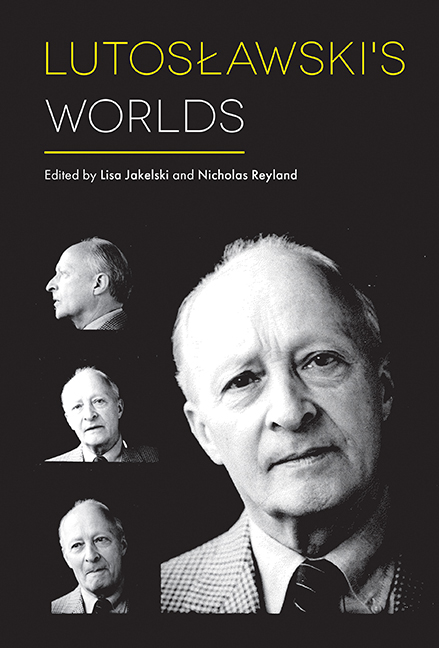Book contents
- Frontmatter
- Dedication
- Contents
- List of Figures
- List of Tables
- List of Music Examples
- List of Contributors
- Acknowledgements
- Introduction
- PART I mourning, modernism, and genius
- PART II other lutoslawskis
- PART III documents
- PART IV political engagement
- 11 Lutoslawski and Stalinism: Contextualizing Artistic and Political Choices around 1950
- 12 Lutoslawski's Political Refrains
- PART V legacies
- Bibliography
- Index
11 - Lutoslawski and Stalinism: Contextualizing Artistic and Political Choices around 1950
from PART IV - political engagement
Published online by Cambridge University Press: 14 June 2019
- Frontmatter
- Dedication
- Contents
- List of Figures
- List of Tables
- List of Music Examples
- List of Contributors
- Acknowledgements
- Introduction
- PART I mourning, modernism, and genius
- PART II other lutoslawskis
- PART III documents
- PART IV political engagement
- 11 Lutoslawski and Stalinism: Contextualizing Artistic and Political Choices around 1950
- 12 Lutoslawski's Political Refrains
- PART V legacies
- Bibliography
- Index
Summary
In a series of interviews with Irina Nikolska late in his life, Witold Lutosławski claimed a distance from the political events of the Stalinist era, stating: ‘The very thought that many people believed me to have collaborated with the regime is bitterly painful to me … I've never been disposed to make a compromise.’ How do we make sense of this statement, given that around 1950 Lutosławski composed a number of political mass songs, two ideology-infused cantatas, and several folk-based works that fit comfortably within the concept of socialist realism? This article will explore Lutosławski's entanglement with socialist realism and the political structures of that time, and will present a picture rather at odds from the popular and scholarly understanding of the composer that exists, one or two notable challenges excepted, both in Poland and elsewhere. Lutosławski seemed supportive of at least aspects of the program of Polish communists in the years around 1950, but then grew increasingly frustrated and disillusioned. I argue that his initial cooperation with many communist goals was representative for Polish composers as a whole, and not surprising given both the consensus about the postwar rebuilding of Polish culture and also the appreciation for significant party support for new compositions and for expanded performance opportunities. The Lutosławski described in this article is not a transcendent musical genius who somehow remained untouched by the realities of Stalinist Poland, but is rather an engaged participant in contemporary professional and artistic activities and debates, just like the overwhelming majority of his composer colleagues. The article will grapple with this complex, understudied, and formative phase in Lutosławski's development as a composer, and situate his compositional and political activities within the larger context of Stalinist Poland.
Lutosławski's involvement with socialist realism and Stalinist politics can usefully be divided into two periods, with 1952 as a turning point. Like nearly all Polish composers in the late 1940s and early 1950s, Lutosławski was broadly receptive to the communist project and, as this essay will demonstrate, his compositional choices reflect that. Beginning in 1947, communists and their allies turned to the cultural world and began to assert increased control over artistic production.
- Type
- Chapter
- Information
- Lutoslawski's Worlds , pp. 257 - 272Publisher: Boydell & BrewerPrint publication year: 2018



